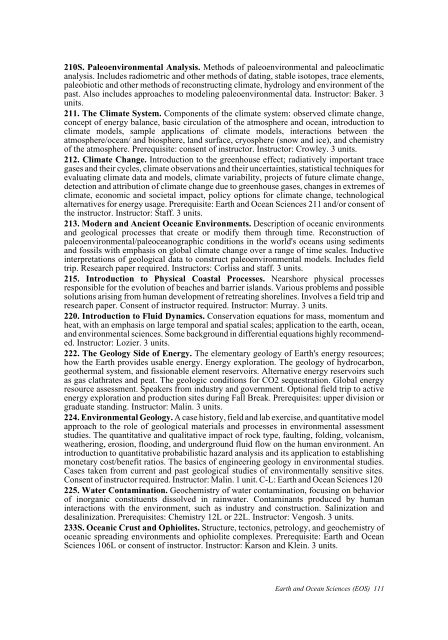2005-06 - Office of the Registrar - Duke University
2005-06 - Office of the Registrar - Duke University
2005-06 - Office of the Registrar - Duke University
Create successful ePaper yourself
Turn your PDF publications into a flip-book with our unique Google optimized e-Paper software.
210S. Paleoenvironmental Analysis. Methods <strong>of</strong> paleoenvironmental and paleoclimatic<br />
analysis. Includes radiometric and o<strong>the</strong>r methods <strong>of</strong> dating, stable isotopes, trace elements,<br />
paleobiotic and o<strong>the</strong>r methods <strong>of</strong> reconstructing climate, hydrology and environment <strong>of</strong> <strong>the</strong><br />
past. Also includes approaches to modeling paleoenvironmental data. Instructor: Baker. 3<br />
units.<br />
211. The Climate System. Components <strong>of</strong> <strong>the</strong> climate system: observed climate change,<br />
concept <strong>of</strong> energy balance, basic circulation <strong>of</strong> <strong>the</strong> atmosphere and ocean, introduction to<br />
climate models, sample applications <strong>of</strong> climate models, interactions between <strong>the</strong><br />
atmosphere/ocean/ and biosphere, land surface, cryosphere (snow and ice), and chemistry<br />
<strong>of</strong> <strong>the</strong> atmosphere. Prerequisite: consent <strong>of</strong> instructor. Instructor: Crowley. 3 units.<br />
212. Climate Change. Introduction to <strong>the</strong> greenhouse effect; radiatively important trace<br />
gases and <strong>the</strong>ir cycles, climate observations and <strong>the</strong>ir uncertainties, statistical techniques for<br />
evaluating climate data and models, climate variability, projects <strong>of</strong> future climate change,<br />
detection and attribution <strong>of</strong> climate change due to greenhouse gases, changes in extremes <strong>of</strong><br />
climate, economic and societal impact, policy options for climate change, technological<br />
alternatives for energy usage. Prerequisite: Earth and Ocean Sciences 211 and/or consent <strong>of</strong><br />
<strong>the</strong> instructor. Instructor: Staff. 3 units.<br />
213. Modern and Ancient Oceanic Environments. Description <strong>of</strong> oceanic environments<br />
and geological processes that create or modify <strong>the</strong>m through time. Reconstruction <strong>of</strong><br />
paleoenvironmental/paleoceanographic conditions in <strong>the</strong> world's oceans using sediments<br />
and fossils with emphasis on global climate change over a range <strong>of</strong> time scales. Inductive<br />
interpretations <strong>of</strong> geological data to construct paleoenvironmental models. Includes field<br />
trip. Research paper required. Instructors: Corliss and staff. 3 units.<br />
215. Introduction to Physical Coastal Processes. Nearshore physical processes<br />
responsible for <strong>the</strong> evolution <strong>of</strong> beaches and barrier islands. Various problems and possible<br />
solutions arising from human development <strong>of</strong> retreating shorelines. Involves a field trip and<br />
research paper. Consent <strong>of</strong> instructor required. Instructor: Murray. 3 units.<br />
220. Introduction to Fluid Dynamics. Conservation equations for mass, momentum and<br />
heat, with an emphasis on large temporal and spatial scales; application to <strong>the</strong> earth, ocean,<br />
and environmental sciences. Some background in differential equations highly recommended.<br />
Instructor: Lozier. 3 units.<br />
222. The Geology Side <strong>of</strong> Energy. The elementary geology <strong>of</strong> Earth's energy resources;<br />
how <strong>the</strong> Earth provides usable energy. Energy exploration. The geology <strong>of</strong> hydrocarbon,<br />
geo<strong>the</strong>rmal system, and fissionable element reservoirs. Alternative energy reservoirs such<br />
as gas clathrates and peat. The geologic conditions for CO2 sequestration. Global energy<br />
resource assessment. Speakers from industry and government. Optional field trip to active<br />
energy exploration and production sites during Fall Break. Prerequisites: upper division or<br />
graduate standing. Instructor: Malin. 3 units.<br />
224. Environmental Geology. A case history, field and lab exercise, and quantitative model<br />
approach to <strong>the</strong> role <strong>of</strong> geological materials and processes in environmental assessment<br />
studies. The quantitative and qualitative impact <strong>of</strong> rock type, faulting, folding, volcanism,<br />
wea<strong>the</strong>ring, erosion, flooding, and underground fluid flow on <strong>the</strong> human environment. An<br />
introduction to quantitative probabilistic hazard analysis and its application to establishing<br />
monetary cost/benefit ratios. The basics <strong>of</strong> engineering geology in environmental studies.<br />
Cases taken from current and past geological studies <strong>of</strong> environmentally sensitive sites.<br />
Consent <strong>of</strong> instructor required. Instructor: Malin. 1 unit. C-L: Earth and Ocean Sciences 120<br />
225. Water Contamination. Geochemistry <strong>of</strong> water contamination, focusing on behavior<br />
<strong>of</strong> inorganic constituents dissolved in rainwater. Contaminants produced by human<br />
interactions with <strong>the</strong> environment, such as industry and construction. Salinization and<br />
desalinization. Prerequisites: Chemistry 12L or 22L. Instructor: Vengosh. 3 units.<br />
233S. Oceanic Crust and Ophiolites. Structure, tectonics, petrology, and geochemistry <strong>of</strong><br />
oceanic spreading environments and ophiolite complexes. Prerequisite: Earth and Ocean<br />
Sciences 1<strong>06</strong>L or consent <strong>of</strong> instructor. Instructor: Karson and Klein. 3 units.<br />
Earth and Ocean Sciences (EOS) 111









